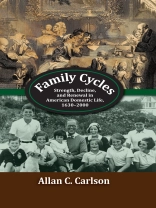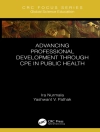In this paradigm-shifting volume, Allan C. Carlson identifies and examines four distinct cycles of strength or weakness of American family systems. This distinctly American family model includes early and nearly universal marriage, high fertility, close attention to parental responsibilities, complementary gender roles, meaningful intergenerational bonds, and relative stability. Notably, such traits distinguish the “strong” American family system from the “weak” European model (evident since 1700), which involves late marriage, a high proportion of the adult population never married, significantly lower fertility, and more divorces.
The author shows that these cycles of strength and weakness have occurred, until recently, in remarkably consistent fifty-year swings in the United States since colonial times. The book’s chapters are organized around these 50-year time frames. There have been four family cycles of strength and decline since 1630, each one lasting about one hundred years. The author argues that fluctuations within this cyclical model derive from intellectual, economic, cultural, and religious influences, which he explores in detail, and supports with considerable evidence.
Tentang Penulis
Allan C. Carlson is president emeritus of the Howard Center for Family, Religion, and Society in Rockford, Illinois and was distinguished visiting professor of history and politics at Hillsdale College.












